
Tuesday, May 04, 2010
From The Book Darkness Descending: The Insights On Rudy Guede
Posted by Peter Quennell
Above and just below: Abidjan, the very attractive West African city where Rudy Guede was born and where he lived until he was five.
Darkness Descending includes this well-researched and revealing portrait below of Rudy Guede and the two traumatic experiences that really threw him: his moving in with the Caporali family, and the collapse of the restaurant in northern Italy which briefly employed him.
No claims here about Rudy Guede being a drifter or drug-dealer or dangerous knife-wielder or petty criminal.
None of those things are confirmed by the record or the Micheli report, and few or none in Perugia or Italy generally seem to believe Rudy Guede was the sole perpetrator or even the main perpetrator of Meredith’s death.

(Above: the downtown of Abidjan, the economic and former political capital of the Ivory Coast)
From Darkness Descending by Paul Russell and Graham Johnson (Pocket Books) pages 292 to 296
Unlike Amanda and Raffaele, the background of Rudy Hermann Guede seemed to inspire a degree of sympathy in readers and viewers.
At least once the undercurrents of reactionary racism had run its course and readers were able to identify with Guede the individual.
Guede had been dragged up a virtual orphan. He seemed to be luckless, directionless, prone to following others into trouble, his carers said. He’d never had a paternal figure to look up to or guide him.
That, and the fact that once he’d been caught he seemed to be at least trying to tell the truth about his involvement with Meredith, gave him a certain credibility.
He was often given a fair hearing in the papers for not trying to evade guilt by changing his story. Editors and readers seemed to appreciate that he had not relied on high-powered family connections to duck out of one of the most tragic cases that had ever come before them.

(From Piazza Italia at the south end of the walled city - Rudy Guede first lived off there to the south-east)
Guede came to Italy in 1992, when he was five years old. His father Roger had emigrated from the Ivory Coast a few years before at a time when the Italian economy needed new manpower to fuel the country’s post-industrial boom…
Roger Guede had trained as a teacher in the former capital city of the Ivory Coast, Abidjan, where his wife still lived with little Rudy, but in Italy he found work as a bricklayer.
Life was hard because of exploitation, denial of workers’ basic rights and rampant illegal labour.
After five years he was granted a regular resident’s permit and returned to Abidjan to his wife, to see if he could take the young Rudy back to Italy with him. She agreed that in Italy he would have a chance of a better life.
Roger and Rudy found a flat in the shabby low-lying suburb of Perugia called Ponte San Giovanni. The neighbourhood was not at the top of the hill, with its wide vistas, ancient buildings and air of academia.
Roger’s life had no room for aspiration or fanciful gap-year adventures. He settled for a seedy new-build on the valley floor near the railway station. An unhealthy stream meandered through the projects like a sewer.
Still, it was better than the shanty town where Rudy’s mother was eking out a bare existence.
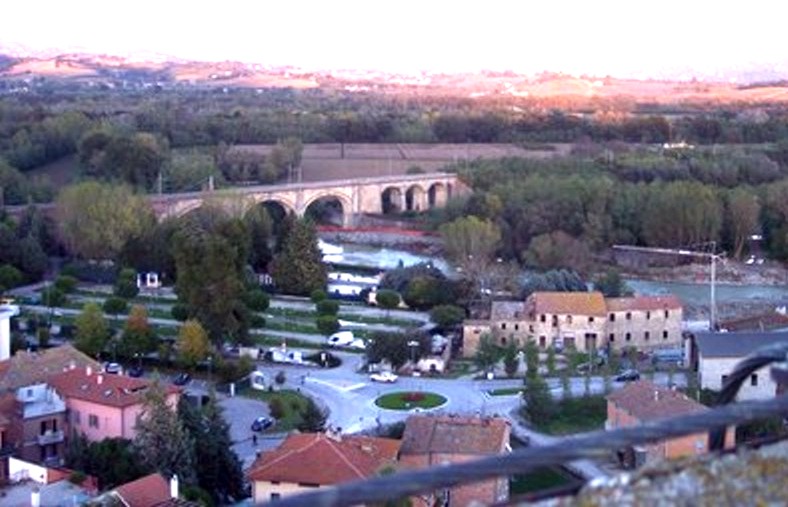
[Shots here and just below of Ponte San Giovanni, the town just to the east where Guede first lived]
New to immigration, Italy’s attitude to race relations has often been schizophrenic. Far-right extremists have been known to whip up dissension. But in Perugia, a small community like many that made up the backbone of Italian society, Roger and his son were welcomed.
His presence stimulated the lively cutiosity of Italians, not their hostility. The kindness of his neighbours and the willingness of social services to offer him childcare were proof of that, and he was free to hit the road to find building-site work.
During these absences Rudy was fostered by local families. One of his first full-time carers was a Mrs Mancini, who had been his maths teacher at school. She never lost interest in him and was to be like a second mother.
Rudy also struck up a lifelong friendship with her son Gabriele and another schoolmate, Giacomo Benedetti. The fabric of a closeknit Italian working-class community felt like a protective cloak and Rudy thrived.
His teachers and foster families all say that he was a quiet child, well behaved and responsible. He had moments of daydreaming stupidity, but no more than other kids.
He was good at basketball - tall, athletic and serious. The local professional basketball team was sponsored by one of Italy’s most successful companies, Liomatic, who manufactured coffee dispensers - a link that would later change the course of his life.
One day, Rudy’s dad went home to Abidjan to renew his passport, but civil war broke out when he was in the country and instead of spending two weeks away from his son he was trapped for six months, as strife raged in the Ivory Coast.
Back in Italy, the social services stepped in with a view to formalizing Rudy’s foster status and finding a long-term home for him.
Rudy was unhappy but he coped with the loneliness and uncertainty with admirable courage. He didn’t complain. And he was soon rewarded. Astonishingly, he was catapulted into the heart of one of Italy’s richest families.
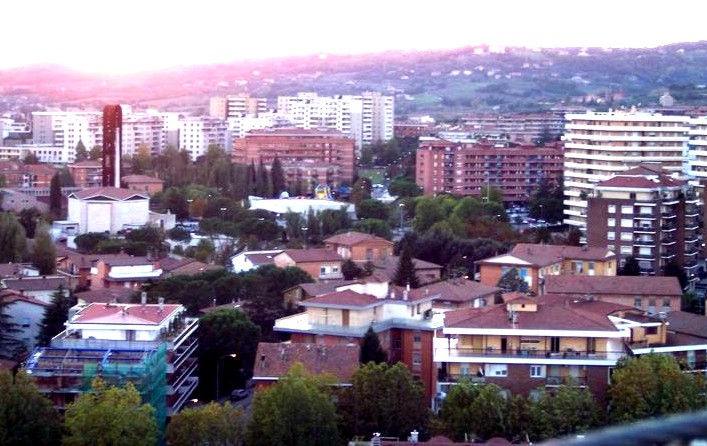
[Another shot of Ponte San Giovanni, where Guede in his early days apparently lived happily]
His change of fortune was like something out of the plot of the musical Annie. Rudy had met one of the Caporali sons at basketball. Now the family wanted to officially take him in as one of their own. He never lived with Roger again.
The change wasn’t smooth. Rudy found it difficult to adapt. When he moved out of Ponte San Giovanni, he lost touch with many of his old friends, which he found particularly hard.
They had been the bedrock in what had so far been a rather unstable family life. He soon missed the informality, the lack of pressure to succeed and the maternal bonds that Italian families are famous for.
It wasn’t long before his new father figure, Paolo Caporali, was calling Rudy ‘an inveterate liar’. He skipped school and spent his time in front of the television or on PlayStation. Caporali’s wife and kids were much kinder in their view:
Rudy was introverted and shy. He lied to protect himself, but not maliciously to hurt others or gain personal advantage.
The move from a poor area to the home of the super-rich Caporali family had confused Rudy and, to some degree, had embarrassed him.
His basketball trainer Roberto Segolini said Rudy was friends with everyone and never missed a training session. Where he could prove his worth and show success to his new high-status family, Rudy thrived.
With such a chequered school career, Rudy would find it hard to find a job that suited him once he left school. But at the age of nineteen he went to stay with an aunt in Lecco and landed a job as a waiter in Pavia.
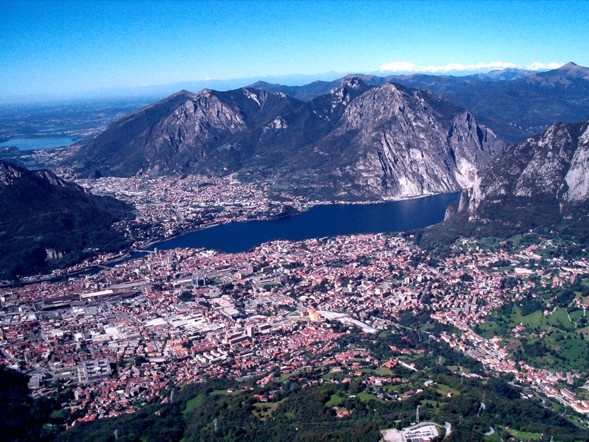
[Shot of Lecco north of Milan where at age 19 Rudy Guede moved to live with an aunt]
Finally, he had found his way. He was ecstatic. He was now going to prove that he could knuckle down and stand on his own two feet. He thought about learning the trade and one day opening a restaurant.
But as soon as he settled in, the rug was pulled from under him - his employer was arrested and the business folded.
To someone with a fragile view of himself, this chance setback took on a great and doom-laden significance. Rudy blamed himself and worried about how he would explain his bad luck to the Caporalis.
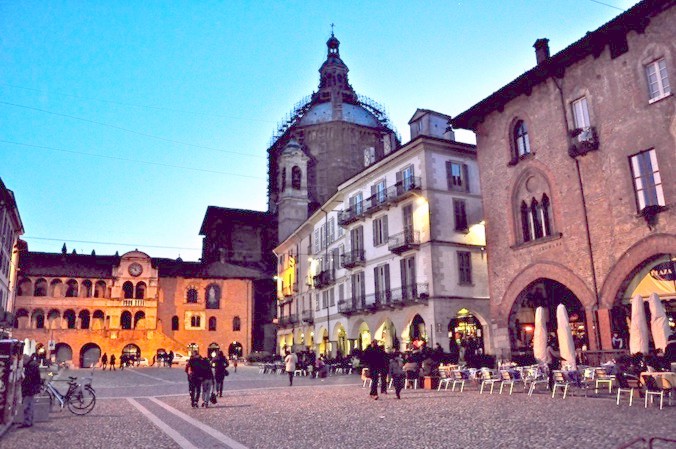
[Shot of Pavia south of Milan where Rudy Guede worked as a waiter till the restaurant collapsed]
Confidence shattered, he fled back to Perugia in shame. It was July 2007 and the beginning of the long summer that would end in tragedy.
The Caporalis were desperate to bolster his self-esteem. In August they found him a gardener’s job at a restaurant they owned out of town.
He stayed with the Mancinis, where the father and mother made sure he got up early to catch the bus. But the rot had set in; he wanted to live where the excitement was.
He was distracted by the scallywag antics of the lads in Perugia, who never seemed to work but always had money, and by the beautiful students from allover the world who were descending on the University to find digs and party.
Amanda and Meredith would be among them. Once he failed to go to work for a whole week, claiming he had flu and snivelling unconvincingly over the phone. He was sacked.
He lived off his savings until 2 November, when the murder and his doomed getaway would end any hopes he had of turning his life around.
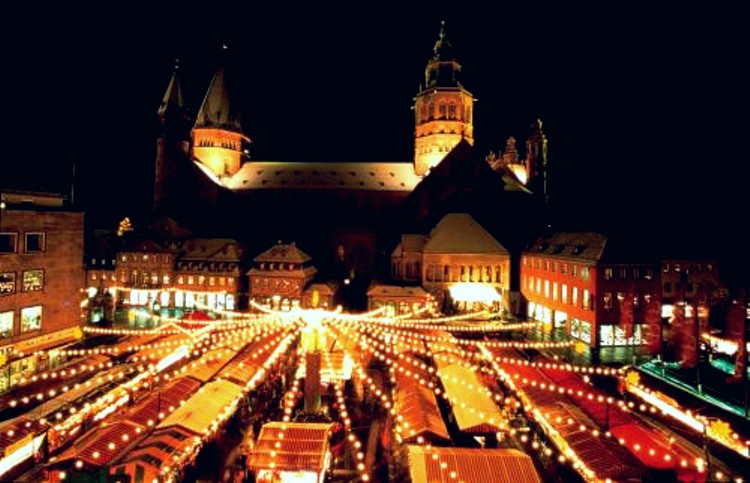
[Shot of Mainz on the Rhine between Frankfurt and Bonn where Rudy Guede was captured]
Comments
Peter, can we please get an update on when the sentencing report will be translated to English? Thanks very much.
Hi Devorah,
The judges’ sentencing report has already been translated into English. The proofreading team are currently checking the document. Footnotes and a glossary are also being added. It is anticipated that the report will be ready in a few days.
Tricky legal and technical terminology throughout the document took as much time to put to bed as the rest of the document put together. Sometimes just a single phrase took days to be finalized.
Several of the team, which is on three continents, do United Nations translation and that is the level being hit. It is way beyond anything normally demanding in the translation field.
Oh and a warning. It is big. And very complex. It may take you as much time to read as any two or three of the books.
At the very beginning, I remember that the adoptive family was adamant he could not do such a thing. Do we know if people came to his defense, if they are still in touch etc…?
Reposted here for Hopefiul:
5/5/10
It’s tragic how Rudy kept getting his confidence smashed until he gave up. Tragic.
Hi Patou. No, we dont hear talk of any friends, any support for Guede, though that does no mean there are none, and it is a good point for us to follow up on around Perugia.
He had two adoptive families in effect - the Mancinis and the Caporalis.
You recall that the Mancinis supported him? If yes, then that sounds about right.
In the case of the Caporalis, it was not so much a case of Papa Caporali inviting Rudy into his home and eager to “adopt” him as his basket-ball-playing son and good buddy of Rudy.
Papa Caporali seemed almost too eager to sell him down the river after the arrest. We did some searching, and cannot find where he personally spoke any but negative words about Guede.
News from Seattle about Ruede:
Knox accomplice appeals murder conviction
http://www.komonews.com/news/local/93069964.html
The appeal to the Supreme Court is the routine second level of appeal, and even in the Italian media we are seeing no new angles. The BBC report. Guede already seems to have had every possible advantage from his selection of the short-form trial in October 2008 in front of Judge Micheli. Although he did not plead guilty selecting the short form is generally taken in Italy to imply some sort of involvement in the crime in question, and he did admit he was present.
“Hi Patou. No, we dont hear talk of any friends, any support for Guede, though that does no mean there are none, and it is a good point for us to follow up on around Perugia.”
Pete, I think there were two friends that showed up at his appeal in December. I can’t remember who they were exactly, but I’m thinking they were old school/basketball buddies.
Thanks for sharing the DD excerpt. It helps us to understand Rudy’s character a little better.
Hi Lola. Generally we have taken a pretty firm line on Guede because of the rape and the failure to call an ambulance which just might have saved Merdith’s life. Plus we have wanted him to squeal.
That he didnt get along with Papa Carporali has long been clear - the writers of the book give us one interpretation of why, based on credible interviews done on the spot; you give us another.
The courts themselves have struggled to get the question of lead perpetrator right and will probably continue to do so.
The Micheli Report of January 2009 essentially endorses a scenario where Guede did something pretty terrible, but did not take the lead - the position of the prosecution both in his own trial and in the AK/RS trial.
In Guede’s appeal hearings last December, the appeals judge did not reverse this interpretation, and gave Guede some time off for admitting to having been there, showing some repentance, and trying to apologize to Meredith’s family.
Not all of us here feel that a mere 16 years fits the terrible crime - especially as he could be out on parole in five - but much of the deduction related to his lawyers gamble on the short-firm trial. .
The Massei Report of March 2010 on the RS/AK sentence hypothesizes (as we reported) that Guede started the attack on Meredith, and the other two then joined in. However the report is also very critical of all three for not being far more forthcoming. None of them are let off lightly.
And the prosecution has already (as we reported) lodged an appeal against the Massei interpretation and sentence.
I wonder if you have an authentic source for the statement that Guede “made the deliberate choice to become a drug-dealer and petty criminal” ? He was never previously convicted and may or may not have dealt drugs.
******
The next few posts coming up by our poster Cesare Beccaria (an Italian lawyer) will go a lot more into this question of the positionings by the lawyers and the perps.
Apologies that they took so long, but we think that you will appreciate why.
5/11/10
Lola,
Rudy’s seeming ingratitude to his adoptive family is a cause for great regret to him now, his letters from prison indicate. His real decline seems to stem from a visit back to the Ivory Coast after he’d spent a long time in Italy. He was sent to stay with his mother for a few weeks. He was looking forward to it. It was a disaster. Who knows what miseries he encountered there? Instead of this visit helping him, when he returned to Italy, he was completely shut down, muffled, blank, withdrawn into himself. Consider along with this letdown the somewhat absentee father he had for much of his life. In fairness, it’s commendatory that his father did try to work hard in Italy, but it left Rudy alone. His youth was turmoil and constant change.
Maybe Rudy missed the critical period of bonding as an infant that is the basis of trust. Once that foundation is cracked, the person has a very hard time feeling accepted or confident of approval. Out of this fear, he rejects others, “pushes them to walk” before they reject him. The Caporali family and the people in Italy who poured what seem a great deal of love and resources on this orphaned boy, deserve kudos for their efforts. They did more than most people would. However, we don’t know the whole story, or the attitudes of each family member towards Rudy. He would have been very susceptible to Mr. Caporali’s opinion of him. He would have wanted the Caporali sons’ approval most of all. Whether he got it is unknown. He seems to have turned to friends for moral support, often a sign that a person can’t receive from family.
It’s hardly surprising that Rudy was unable to overcome his doubts about his place among these wealthy Italians who were not even his own race or socioeconomic group. He did try to fit in, it seems, and not cause serious problems. He seems to be a gentle soul, apart from the horrid catastrophe of Nov. 2007, but he was lost, a stranger in two worlds. He was too low for this family as he saw it and too high to return to the grinding poverty of N. Africa which he probably barely felt a part of having been brought to Italy young. Multiply these stressors as he entered adulthood.
How could he have avoided feeling uncertain of his place in a wealthy Italian family whose sons were loved from birth and who he felt he had to compete with, an impossible task? The adoptive family may have not realized that he felt so estranged deep down, nor that their ordinary standards and lifestyle may have placed demands on Rudy to be something he was not. His efforts at the restaurant where he thought he’d finally found a chance to achieve and repay kindness, ended in collapse. The family again intervened to help him, but though done with the best will in the world, they got him a job on the outside of a restaurant, groundskeeping, a symbol of being on the outside yet again. He was too weak to fight his bitterness and disappointment, and became disillusioned. Now completely vulnerable, he fell for the easy temptations of the world, drugs and instant gratification, theft. Unhappily for all concerned, he’s paying the price.
It is very difficult to convey to a healthy person the sense of defeat and hopelessness that destroys the energy of persons who were rejected by both parents, or who honestly believe they have been rejected. His father visited him in prison but Rudy refuses to see him. That speaks volumes, “too little too late”.
When the restaurant job ended, Rudy was not mature or wise enough to be his own best friend, to push himself beyond his comfort level and strive to do right long enough to reap the harvest of it.
He may be able to work out his inner demons in prison more readily than surrounded by the bounty he didn’t feel entitled to and the wealthy “brothers” he felt would surpass him. Belonging and unconditional love are a big part of anyone’s identity and self-esteem. It’s possible that out of ignorance, despite an abundance of love and goodwill, Rudy’s adoptive family did not give him those sure and steady small steps to improve his self-esteem. He needed loving discipline and small tasks and jobs, a schedule, a plan organized for him at his level, so that step by step he could have restored his selfworth.
It’s very disorienting to be elevated suddenly or demoted suddenly. Vast change from the outside is a stressor, not immediately a benefit. AK in her own way destroyed all her potential the minute she reached an emotional mountaintop, and RS seems to have been slowly chipping away at his father’s trust and admiration by doing drugs in college. Boom, he fell from a position of great potential and wealth. The 3 actors in this one-act play seem to be alike: so much potential, then sudden devastation.
In this regard, they differed greatly from Meredith. She would have made something of herself, she was steady. She would have given the world something wonderful with her life. Every indicator shows her a careful, serious, and well-adjusted person with high ambitions yet humility and a natural affection for her family rather than self-destructive rebellion.
In a nutshell: I feel sorry for Rudy, but I don’t condone his bad behavior before or including the MK incident. (The latter goes without saying.) I do somewhat feel for the fellow due to his abandonment issues. Such is the extreme power of parental authority to make or break a child.
It’s a truly great and heroic person who, without parental support or acceptance, achieves in life what would be considered normal success among those who’ve had the great fortune to be loved and treasured from birth.
As someone who was foiked out to foster homes/children’s homes at various points of my childhood I can say that, from my own experience, the more well off the foster family does not necessarily mean that the foster child has a better experience.
Actually, I’d say it was the reverse, the people who foster out of love are those I remember with the most fondness - people who had little more than a spare bed but were prepared to share that and open their hearts to a child were amazing: those who wanted to be seen to be being good and charitable taking in a child almost as if it were a badge of honour were the worst. I remember one time when I arrived at a foster home to a dinner party, my new “mum and dad” had invited two other couples to have dinner with them and their new charge, and the result was a massive dressing down because I had no table manners - trust me, in a children’s home you grab what food you can and eat it at top speed before someone bigger and stronger than you takes it off you, to this day I am always the first to finish my meal, somethings get too deeply ingrained to change.
Not to mention the fact that any re-homing situation always feels tenuous - I never knew if the foster family would change their mind and I would end up back at a children’s home or if my parents would decide they wanted me back - you never settle, even the brightest day has a dark cloud lingering.
My point being that Rudy Guede may seem to many to have had a wonderful opportunity handed to him when he went to the Carporali family, but maybe he had similar feelings to those I had when I was a child, maybe he was waiting for his father to return, maybe the pressures to succeed because of the opportunities provided were too much for a boy who had never had to have dealt with such pressure before.
‘Traumatic’? Any change of family for a child is traumatic.
None of this excuses Rudy Guede’s actions, he alone is responsible for what he did, and he is paying the price for what he did (whether 16 years is a suitable punishment is a different question altogether). He could have made a better life out of the cards he was dealt, a troubled childhood does not prevent a successful adult life, although it does leave scars.
5/11/10
Innai,
Thank you for saying more clearly the truth about Rudy. Your personal experience validates your words. I totally agree with you that the pure motives of foster parents and their good natures are the best things they have to offer a child. Wealth alone doesn’t create love or virtue.
A child senses the truth immediately about someone’s attitude toward him. Instinct is a powerful thing. The child has few options so he masks a lot and tries to survive. He has to repress his true feelings. Perhaps they work themselves out later when he is safe.
You highlighted how Rudy kept wondering if his natural father would return for him any day. That cleared up a lot for me and explains why he could never have firmly transferred his affections to the adoptive family.
That also makes sense of his goal to be “an American black”. That seems a normal reaction when he realized he could not embrace his African nor Italian heritage with a whole heart, and saw himself more akin to the successful black sports figures in America due to his talent with basketball. Maybe he felt drawn to Amanda hoping to identify with American dreams.
Early imprinting affects our whole life. Your conclusion that a troubled childhood doesn’t prevent a successful adult life but does leave scars, sums up a world of truth succinctly. Thanks for that beautiful statement, a tonic for self-pity and despair.
Hi Lola. “Everything that I read…” Here? Plenty of rumors have been floated about Guede, the most recent by Alessi. It is harder to nail down the sources, and the truth. Judge Micheli was very skeptical - and it was he that handed Guede 30 years. On the whole, with regard to Guede, the truth looks to us fairly mundane, and the fact remains that he had no previous charges against him. Check Sollecito out - he had a checkered past as well, with drugs involved - and Knox did have a prior conviction. And both admitted being users.
From Hopeful’s really excellent analysis above: “AK in her own way destroyed all her potential the minute she reached an emotional mountaintop, and RS seems to have been slowly chipping away at his father’s trust and admiration by doing drugs in college. Boom, he fell from a position of great potential and wealth. The 3 actors in this one-act play seem to be alike: so much potential, then sudden devastation.”
All three.
Every person should have something that they hold sacred, a boundary that they would never cross. AK said she would never harm anyone in her family ( although my guess is that there were more than a few moments in which she wished her stepdad might drown?).
I have known my share of self-destructive people, friends who drank to excess, cut themselves with razorblades or burned their own skin with cigarettes. They had cause to feel distress, usually having to do with parents/steps… They acted out against themselves, never dreaming of harming others.
My mother had a wonderful family; this I know, because they raised me throughout her drug-addled absence. What little I saw of her wasn’t too pretty, yet she had a brilliant wit and unncanny talents that shone through all too infrequently. This June will
mark the third anniversary of her particularly nasty suicide. She acted out from childhood on up, never violently, but verbally and through an insatiable taste for risk. We always expected the police to phone. I see in Amanda Knox hints of my mother’s utter disregard for the trauma she caused her family. It was always about her; if others didn’t get it, oh well—“Shit happens”.
My ears perked when mention of RS’s mother’s death by suicide came up. But I guess those turned out to be Amanda’s overdramatising his life and woes. I still see him as purely stuck up. He volunteered that he’d accidentally pricked Meredith’s hand while they were cooking (fish? the same fish that left blood on his hand and on the knife handle he placed in Amanda’s sleeping hand?). He’d “apologised—quickly—so all was forgiven. Perhaps he whispered an apology over her dying body, which made it all forgiven, like a few dozen Hail Marys?
As to Guede, rough start for any kiddie, but still, it’s all poor him. Meredith was dying. He could have phoned anonymously for help and still made his (failed) escape. He needn’t have let the other two witness him wimping out. Unless the killing was pre-planned, and her death pre-agreed as having to be absolute.
Gangs have hazing requirements that call for bloodshed to prove the recruit’s worth. Were they forming their own “gang”? A 15 year old named Alyssa Bustamente is currently awaiting trial in the States for killing her younger sister’s 9-year-old classmate, “to see what it felt like”. She strangled the girl, stabbed and slit her throat. At first she bragged about it, but once in custody, has pled not guilty. The victim, collateral damage.
Sorry to be all over the map, here. I hope you can see the connection I am drawing. People have crappy lives. Doesn’t mean someone else has to pay the price.
5/13/10
Mimi,
Great post. The “utter disregard for the trauma they caused family” is the essence of this crime. Your friends that act out against self rather than become violent toward others take the higher road. AK, RS, RG may all have a secret desire for violence and aggression against others whether their lives were easy or hard. I agree with you that it’s down to the individual’s choice how he will express his pain.
Yes Lola. I do get it. Really. It remains a vague area, and so is the possible move from hash to cocaine or crystal meth, both highly addictive mind-bending drugs, on the part of the other two. The only one who had a prior conviction was Knox. The only one who has even remotely shown remorse and tried to apologise to Meredith’s family is Guede. The judges as a group could not pick one better perp or one worser perp. Frankly we want all of them to come clean. Nobody gets off the hook.
Where next:
Click here to return to The Top Of The Front PageOr to next entry How Each of The Three Subtly But Surely Pushed The Other Two Closer to The Fire (Part 1 of 4)
Or to previous entry From The Book Darkness Descending: The Insights On Knox And Sollecito

